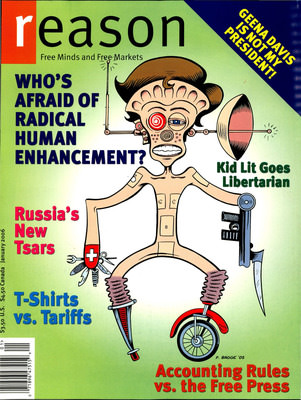Which Presidential Candidate Is Pumped about Driverless Cars, 3D Printing, and Gene Editing?
"I think it is important to not regulate the AI industry," says Gary Johnson.

One of the most appalling things about the 2016 election is how backward-looking virtually all of the candidates are.
Hillary Clinton and Donald Trump are early baby boomers and true to that generation's solipsism, they can only envision American greatness in the terms of their youth (that they are obsessed with banal notions of national greatness is its own problem). Trump wants to make the country "great again," by which he means returning to a whiter, less ethnically diverse country with markedly fewer Mexicans (the percentage of foreign-born residents in the United States reached its low ebb in 1970). Like Hillary Clinton, he's against trade with foreign countries unless the deals are stacked against our partners. Both share a fixation on growing manufacturing jobs (factory jobs) here in the United States. I'd argue that's because when they were young, America defined "good, middle-class jobs" as factory work (not that either of them would stoop so low as to pull shifts on an assembly line). What they don't realize is that they grew up in a weird, short-lived moment. Thanks to protectionist trade policies, global rebuilding associated with World War II, and pent-up demand in the vast American market, the United States was indeed dominant for a few decades in terms of manufacturing and trade. But that couldn't—and shouldn't—last. Europe and Asia rebuilt, Africa decolonized, and South America developed their own markets and capabilities. The result is vastly wealther world in which overall inequality and extreme poverty is shrinking. American is still a manufacturing powerhouse but we use far fewer people to make more stuff than ever, just as we use fewer farmers to generate more food. There's no going back to the 1950s, '60s, or '70s (when manufacturing employment peaked in the U.S.). More important, why would you want to, especially in terms of daily work conditions and social mores?
And yet Clinton and Trump look backwards while talking about the next four years. They are nostalgic and out of touch with the present, much less the future. Add to this Clinton's hostility to the sharing economy, which recasts employees as independent contractors who often work part-time or juggle various gigs. Clinton wants to shut all that down by insisting that, say, Uber drivers, are employees just like rank-and-file steelworkers were back in the day. On top of that, Clinton (and to a lesser degree, Trump) want to create a uniform set of benefits that all employers must give to all employees. Mandated standardization in the great age of personalization and individualization! It boggles the mind.
You listen to Clinton and Trump talk and you'd have no idea that we're in the goddamn 21st century. Trump doesn't even use email and Clinton notoriously refuses to adhere to basic computer-security protocols. Then there's Dr. Jill Stein, who as a doctrinaire Green Party member is against fracking and other bridge technologies that reduce greenhouse emissions as even lower-polluting alternatives come of age (she is of course categorically against nuclear energy too). She has tweeted that her attorney general would "prosecute Exxon for lying to the public about climate change," and she worries about WIFI's effect on kids' brains. She's said various things suggesting she thinks vaccines cause autism, a claim that has been thoroughly debunked (and note, there's a difference between being for or against mandatory vaccination and thinking that vaccines cause autism).
Among the four leading presidential candidates, only the Libertarian Party's Gary Johnson seems not just unafraid of the future but positively pumped up by the ways in which new technologies and innovations are changing how we work and thrive, and how long we might live.
Transhumanist Zoltan Istvan interviewed Johnson at the former governor's New Mexico home and the conversation is forward-looking, to put it mildly. Given Johnson's belief that Uber and Airbnb are models for generating extra value from cars and houses that are otherwise being unused ("We need Uber everything!" he's known to say), it's unsurprising that he looks forward to driverless cars as a way of reducing traffic accidents and congestion.
But Johnson goes way beyond that. Writes Istvan:
I asked Johnson what he thought of those that want to regulate AI [artificial intelligence], and he wrote, "I think it is important to not regulate the AI industry." Johnson said the same thing about the internet industry. As a Libertarian, he wants to leave those industries to themselves. Not regulating AI development goes against some leading thinkers like Elon Musk, but it's right in line with many AI engineers who argue there's little reason to worry about its creation.
Johnson also believes in longevity research. He says he would "sign legislation promoting research and development" of cures for all diseases. In fact, he likes the Facebook's Mark Zuckerberg recent statements that we should aim to cure every disease before this century is out. Johnson also said he would be "vetoing legislation that would restrict" science development.
In the profile, Johnson also backs gene editing and CRISPR technology and says that he'd install a 3D printer in the White House.
This sort of talk jazzes up Istvan, who is himself running for president on the Transhumanist Party ticket (the only party, I assume, where the president and vice president might be clones of one another). He concludes,
I hope Johnson will make it into the Presidential debates (and Bill Weld into the Vice Presidential debates), so along with his fiscal and social policies, he'll be able to share with America a brave vision on the future. Gary Johnson is a top-notch presidential candidate for American science and technology for two reasons: He's excited about it—and he's willing to openly talk about the issues.


Show Comments (128)